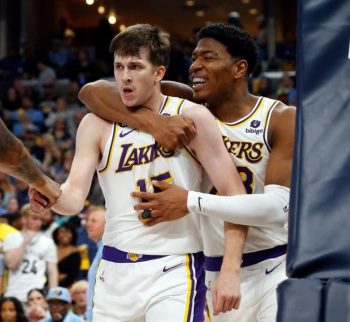NBA
NBA Daily: Who Can the Celtics Turn to Now?

Ready to return home after a long West Coast trip, the 11-3 Boston Celtics dragged their feet into the Denver Nuggets’ Pepsi Center.
The team looked out of sorts early, down 27-13 after another sluggish first quarter, a lack of energy that has plagued the team over the course of the young season. But, early in the second quarter, Boston looked to have turned the corner; an 11-0 run, on the back of some strong defense, quickly had them back in the game.
And then, suddenly, none of it mattered as Kemba Walker collapsed to the floor.
Walker, chasing a loose ball, stumbled into Semi Ojeleye with his head down. Upon contact, Walker dropped to the floor, where he stayed for what seemed like an eternity before he was attended to.
Eerily reminiscent of October 17, 2017, players gathered around, some in prayer, others in shock, as Walker was stabilized and stretched off the court.
Miraculously, Boston finished out the contest and nearly came away a victor, their defense fueling them to a near 19-point comeback. Now, homeward bound, the Celtics await further news on Walker with bated breath.
There is hope: as of the time of this writing, “concussion-like symptoms” was the only official word, while Brad Stevens said postgame that half time tests yielded “good results.” Adrian Wojnarowski reported that “early indications” were that Walker avoided serious injury.
That said, regardless of severity, it would be foolish to rush Walker back. Even if it’s just a concussion, a serious injury in-and-of-itself, the expectation would be that Walker miss some time while in the league’s concussion protocol.
And, in the meantime, the Celtics will likely have to compete without their All-Star point guard. Come Monday night, the team will be back on the floor against the Sacramento Kings, with or without Walker.
So, with Gordon Hayward out until Christmas, and now Walker’s availability up in the air, who can Boston turn to, not only for offense but to lead them on the floor?
It starts with the Celtics’ “veterans,” Jaylen Brown, Marcus Smart and Jayson Tatum. Or, at least, their role is most obvious.
The longest-tenured Celtic, Smart’s role as a playmaker should expand with Walker, and his 4.7 assists per game (good for second on the team), out. Between him and Hayward, Boston will have lost a total of nine assists per game due to injury.
As the team leader in assists per game (five), it’ll be on Smart to mitigate the drop-off and keep the ball moving.
More importantly, it’ll be on Smart to further take up the mantle as the team’s leader. While he has certainly been Boston’s emotional leader in recent years, Walker was a calm, level-headed presence on the court that kept the team in the moment. Now, it’ll be Smart’s job to not only keep the team energized but calm when tempers flare and focused in the moment, regardless of the Celtics’ deficit or lead.
Likewise, Brown and Tatum, already tabbed for more touches in Hayward’s absence, should see a further expanded role.
The two have already proven quite dynamic, as they’ve combined for 39.9 points, 14.4 rebounds and 4.8 assists per game on 43.8 percent shooting and 37.3 percent from three. With Walker’s 21.1 points, 4.6 rebounds and 4.7 assists potentially gone from the lineup, and as the team’s two best players, it’ll be on Brown and Tatum to help fill the void.
Those two, more than anyone else, will also be tasked with stepping up in the fourth quarter. In the final frame, Walker has taken his game to another level: he’s averaged 7.3 points and 51.5 percent from three. He’s sixth in the NBA in clutch-time field goals (9), while his effective field goal percentage of 60.2 percent is also sixth among players that have averaged at least four shots in the quarter.
Brown and Tatum have certainly proven capable in the clutch – Tatum recently put his prowess on display. But it certainly won’t be easy replacing Walker’s production when the game is on the line. Whether they’re up to the task or not could prove critical to the Celtics’ success with Walker out.
Beyond them, responsibility would fall to the bench. Carsen Edwards and Brad Wanamaker would step into more extensive roles, perhaps one of them into the starting lineup, even. Edwards has struggled to find a rhythm, but Wanamaker could prove especially important over these next few games; the second-year guard has averaged 11 points, 1.8 rebounds and 4.2 assists while shooting 51.4 percent from the field and 40 percent from three over the course of Boston’s five-game road trip.
Likewise, Javonte Green, Enes Kanter and Grant Williams could also come into some extra offensive touches. Thus far, the trio has combined for just 10.3 field goal attempts per game.
Of course, Boston could also turn to the G League. Tremont Waters, in spite of his 5-foot-10 frame, is adept with the ball in his hands and could certainly see a call-up in the short term. In his two seasons at LSU, Waters averaged 15.6 points, 2.8 rebounds and 5.8 assists on 42.3 percent shooting.
However the Celtics proceed, there’s little doubt the loss of Walker will be felt. He’s proven critical to Boston’s turnaround from the 2018-19 to 2019-20 season and has been the engine that drove the team’s hot start.
And yet, the ability is there for the team to continue that start – it certainly won’t be overly difficult with their next four games against the Sacramento Kings, a hobbled Brooklyn Nets squad and the New York Knicks.
But it isn’t a guarantee either; it’ll take a concerted effort from players one through 15 to continue winning games. And, if Walker’s return is a quick one, this could all be for not. That said, their response in Denver should at least inspire confidence going forward.














